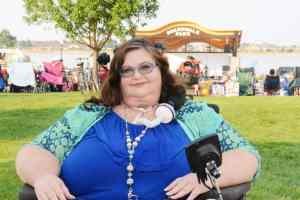Engaging in Politics as a Disabled Person: an Interview with Carrie Ann Lucas

Across the country, people are energized and politically engaged in response to the current political climate. Before you know it, midterm elections will take place next year across the United States. During these elections, it’s important to remember that local politics is just as important as anything at the state and federal level. In my work as a co-partner in #CripTheVote, a nonpartisan online movement encouraging political participation of disabled people, I recognize that public service means more than just running for office. However, it’s a visible and needed sign of involvement and representation.
In that light, I recently interviewed lawyer and disability rights activist Carrie Ann Lucas, who announced in early August 2017 her bid to serve on the Town Board of Windsor, Colorado. Our interview has been condensed and edited for length.
Alice: Tell me a little about yourself!
Carrie Ann: Where to start? I am an intersectional person, I am a single parent, disabled, lesbian, Latina (with an overabundance of white privilege). I am an attorney and work for a state agency supporting and training lawyers to effectively parents (most of whom are disabled) in child protection cases. I am also active in my community, volunteering for several disability rights organization, serving on a town commission, and being an activist.
Alice: I know you primarily on social media for your posts/tweets on activism, disability rights, parenting, and your advocacy for the parental rights of disabled people. What led to your decision to run for the Town Board of Windsor, Colorado?
Carrie Ann: When I was sixteen, my mom was driving the car, and we were behind a gravel semi-truck. My mom told me I always needed to stay back from the gravel trucks when behind them, so we didn’t get our windshield broken. I asked my mom, why wasn’t there a law requiring the trucks to have a cover, to prevent flying rocks. My mom told me the lobbyists for the trucking industry had the power, and ordinary people couldn’t get a law passed that would help us. At that moment, I knew someday I would run for office, and I wanted to be the kind of elected official that would make sure the power remained with my constituents. I have thought about running for office for the past 10 years or so, but as a single parent of four kids, I needed to focus on my family. Now my kids are all adults, so I can devote the time necessary to running and serving my community.
Alice: Since this is your first time running for public office, what concerns did you have, if any, in launching a campaign? What are you most looking forward to during the election?
Carrie Ann: By nature I am a problem solver, so I am looking forward to hearing from my community about the problems they face, and helping solve those problems. I was concerned with some of the accessibility issues with campaigning, such as door knocking, because most houses don’t have wheelchair access. I have a good network of campaign volunteers that will help me with that process.
Alice: Tell me what you love about living in Windsor and why you want to represent the people of Ward 5.
Carrie Ann: I grew up in Windsor, moved away for college, grad school, and law school. I moved back a couple of years after graduating from law school. I wanted my kids to be in a safe and supportive community with good schools. Additionally, my family lives here. My kids had opportunities here that they would have never had in the large urban school districts in Denver. The community is growing by leaps and bounds. The population is doubling every ten years. We have moved from a small rural, agriculture based community to a suburban community. I live in the older (and more affordable) central core part of town. My district includes the large town parks, many outdoor recreation facilities, and the downtown district. I want to help ensure those services don’t migrate to newer developments in the community, support economic development and continued revitalization of our historic downtown, and work to solve the traffic congestion problems we have here in town.
Alice: One issue that’s part of your campaign is: “Prioritize engagement with residents and businesses.” What does effective and authentic engagement of constituents look like to you? How do you plan on engaging with your constituents if you become a member of the Town Board?
Carrie Ann: Elected officials must be physically available to their constituents. Authentic engagement is not simply delivering a message, but rather listen to constituents, and act on their concerns. Not only do I plan to have regular open listening sessions in the community, but to also engage in active recruitment to bring new voices forward. I also want to be available for my constituents to be able to contact me easily. I have published my cell phone, my address, and my regular email, as well as social media.
Alice: Have you encountered any accessibility issues while campaigning?
Carrie Ann: At this point I have not. As I mentioned before, door knocking is not easy for wheelchair users. However, when my volunteers are door knocking for me, I am available, and have a driver to get me to the location where a voter has a question or concern right away to help mitigate my inability to physically get from door to door. I am also relying on phone lists more. The other place accessibility is problematic is with fundraising. Candidates use house parties to raise funds, but I cannot participate in most locations.
Alice: Is there anything unexpected or surprising that you discovered as you are running for office?
Carrie Ann: I have been very pleased at the community financial support I have received in the first days of my campaign. Financially supporting candidates, even in small amounts is critically important. While money should not equate to a voice, money is speech in this country. Until serious campaign finance reform occurs, money speaks. My town has no limits on campaign contributions, but I am voluntarily limiting contributions to $250 or less per individual because I strongly support campaign finance reform. Marginalized communities will never have equality without campaign finance reform.
Alice: What’s your advice to disabled people who are curious about running for office in local government but hesitant or concerned?
Carrie Ann: Our community is great at advocacy, but as Lin Manuel Miranda said, we need to “be in the room where it happens.” Until we are seated at the table, our power and influence is limited. Our community is a force, and we need to also be a force in elected bodies. We are woefully underrepresented at every level of government. Even ostensibly small decisions have big impacts on our community. While people often think of influence in bigger offices such as state houses and Congress, we need our voices at every level of government. We need people to fill these offices in order to show our people can run, win, lead and move into higher offices. If folks are hesitant to run, I encourage people to connect with candidates, but also to research options for training programs that will equip you to run, and to win.
About Rooted In Rights
Rooted in Rights exists to amplify the perspectives of the disability community. Blog posts and storyteller videos that we publish and content we re-share on social media do not necessarily reflect the opinions or values of Rooted in Rights nor indicate an endorsement of a program or service by Rooted in Rights. We respect and aim to reflect the diversity of opinions and experiences of the disability community. Rooted in Rights seeks to highlight discussions, not direct them. Learn more about Rooted In Rights



